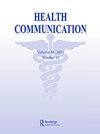患者与医疗服务提供者之间的移动通信与生活方式的改善:研究移动技术身份和健康赋权的作用。
IF 3
3区 医学
Q1 COMMUNICATION
引用次数: 0
摘要
在短短十年间,智能手机凭借其在医疗保健服务方面的优势,在患者和医生中得到了普及和认可。然而,有关移动医患沟通(MPPC)及其对患者生活方式影响的研究才刚刚起步。借鉴健康交流路径模型和移动技术(MTI)理论,我们建立了一个研究模型,以健康赋权作为中介,以移动技术作为调节,探讨移动医患沟通对改善生活方式的影响。432 名参与者(男 = 32.5 岁,女 = 212 人)的研究结果表明,在控制了受访者的年龄、性别、教育程度、收入和总体健康状况后,通过移动设备与医疗服务提供者进行更多交流与生活方式的改善呈正相关,而健康赋权则是这一关系的中介。此外,情感能量(MTI-emotional energy,MTIE)调节了移动医疗伙伴关系(MPPC)与生活方式改善之间的直接关系,而情感依赖(MTI-dependency,MTID)则调节了移动医疗伙伴关系(MPPC)的间接影响。MTIE/MTID 较高的人更有可能从 MPPC 中获益,从而更有可能增强自我保健的能力,保持健康的生活方式。这项研究不仅为日益增多的有关移动健康通信的文献做出了贡献,还为增强患者能力和促进健康的干预措施提供了参考。研究还讨论了其理论和实践意义。本文章由计算机程序翻译,如有差异,请以英文原文为准。
Mobile Patient-Provider Communication and Lifestyle Improvement: Examining the Role of Mobile Technology Identity and Health Empowerment.
In the span of a decade, smartphones have gained popularity and acceptance among both patients and physicians thanks to their advantages in health care delivery. However, research investigating mobile patient-provider communication (MPPC) and its impact on patients' lifestyles is only just beginning. Drawing on the pathway model of health communication and mobile technology (MTI) theory, we developed a research model to explore the effect of MPPC on lifestyle improvement, using health empowerment as a mediator and MTI as a moderator. The findings from 432 participants (Mage = 32.5 years old, female = 212) suggested that after controlling for respondents' age, gender, education, income, and general health status, having greater communication with healthcare providers through mobile devices was positively related to lifestyle improvement and that health empowerment mediated this relationship. Moreover, MTI-emotional energy (MTIE) moderated the direct relationship between MPPC and lifestyle improvement, while MTI-dependency (MTID) moderated the indirect impact of MPPC. Individuals who hold a greater MTIE/MTID were more likely to benefit from MPPC such that they are more likely to be empowered for self-care and maintain healthy lifestyles. This study not only contributes to the growing literature on mobile health communication but also plays a reference role for interventions in patient empowerment and health promotion. Theoretical and practical implications were discussed.
求助全文
通过发布文献求助,成功后即可免费获取论文全文。
去求助
来源期刊

Health Communication
Multiple-
CiteScore
8.20
自引率
10.30%
发文量
184
期刊介绍:
As an outlet for scholarly intercourse between medical and social sciences, this noteworthy journal seeks to improve practical communication between caregivers and patients and between institutions and the public. Outstanding editorial board members and contributors from both medical and social science arenas collaborate to meet the challenges inherent in this goal. Although most inclusions are data-based, the journal also publishes pedagogical, methodological, theoretical, and applied articles using both quantitative or qualitative methods.
 求助内容:
求助内容: 应助结果提醒方式:
应助结果提醒方式:


